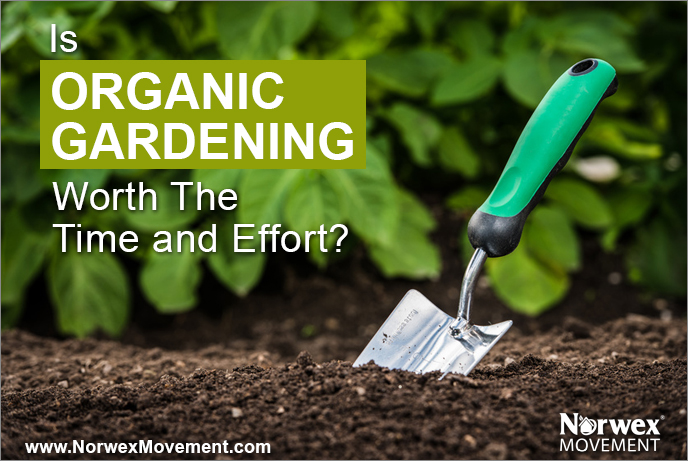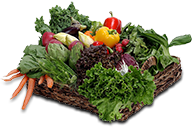

All you gardeners out there—or gardener wannabes—this one’s for you!
There’s nothing quite so fulfilling as delivering a bounty of delicious fruits and veggies, or a bouquet of beautiful flowers, for your family’s enjoyment. And getting down and dirty in the garden is a wonderful way to enjoy the fresh air and sunshine. Plus, there’s just something about the feel of the earth between your fingers… the joy of watching your garden grow… Even whacking weeds can bring a sense of satisfaction.
But what do you use, specifically, to keep those weeds at bay? And how do you deal with those pesky insects who want to munch on the fruits of your hard labor?
Today, more and more are finding organic gardening practices to be a good alternative to synthetic pesticides and fertilizers, especially in light of concerns about harmful chemicals contained in many of them.
What is organic gardening?
Organic gardening is basically gardening without the use of any synthetic products, including pesticides and fertilizers. In addition, organic gardening incorporates the idea of replenishing resources as it makes use of them. It involves the use of compost and other methods of building healthy soil, as well as extra vigilance when it comes to pest control, and knowing which pests to worry about vs. which ones are probably not a big threat.
What are some of the pros of organic gardening?

And the cons?
![]() Tips for controlling weeds: Combine manual weeding with mulching. Mulch is a couple of inches of not-yet-decomposed organic material spread on the ground around your plants to restrict weed growth. It also helps improve your soil’s fertility and health, conserves moisture and prevents erosion. You can use grass clippings, bark, leaves, woodchips, rock, gravel and more.
Tips for controlling weeds: Combine manual weeding with mulching. Mulch is a couple of inches of not-yet-decomposed organic material spread on the ground around your plants to restrict weed growth. It also helps improve your soil’s fertility and health, conserves moisture and prevents erosion. You can use grass clippings, bark, leaves, woodchips, rock, gravel and more.
![]() What to do about insects: Aim for diversity in your garden. A mix of plants will attract more beneficial insects and help prevent a problem from spreading throughout your garden. For example, specific flowers can be planted to attract certain predators which will in turn help protect your garden by consuming bugs that might otherwise do damage to it.
What to do about insects: Aim for diversity in your garden. A mix of plants will attract more beneficial insects and help prevent a problem from spreading throughout your garden. For example, specific flowers can be planted to attract certain predators which will in turn help protect your garden by consuming bugs that might otherwise do damage to it.
If you decide that a pesticide is in order, consider one of these common organic garden pesticides from Gardening.About.com.
Remember, whether you’re an organic gardener or of the more conventional variety—or somewhere in between—don’t forget to enjoy the fresh air and sunshine. The time you spend outdoors is as good for you as it is for your garden!
Resources:
About Home: The Basics for Gardening Organically
Movement Blog: Live Green and Compost
SparkPeople: Organic or Conventional Gardening: What’s Better?
Cambridge Journals: British Journal of Nutrition
About: A Guide to Some Common Organic Garden Pesticides
I have been organic gardening for a few years now and the neighbours cannot get over how much my little garden yields. It is rewarding, easy (once you set up a routine) and I learn and try something different every year.
My son got me started last year with organic gardening. I’m much happier with my flowers and the few herbs I have planted. I was very proud when he told me that mine look better than his! Our families have enjoyed fresh vegetables for 2 years now. My son and daughter in-law does most of the vegi and fruit planting and shares with all of us!
I myself have used the organic pesticide to keep the deer rabbits away from my plants. I’m happy to say it’s working great!
Thank you Norwex for making my life a safer place to live. You keep me thinking of my father who always cooked things natural!
My husband and I organic garden…we plant heritage seeds that we can grow year after year by harvesting our own seeds. Seeds from hybrids don’t always germinate after they have fruited or flowered.
I have a mini five gallon worm farm best soil and fertilizer you can ask for!
This summer I’m part of an organic community garden. It’s been fun so far! My yard is not large enough for a garden, so this is a perfect solution. I’m learning a lot, too!! We love the produce and seeing our efforts pay off. Totally worth it!
The weeds are my biggest challenge! I have just purchased a weed-steamer which is supposed to kill weeds naturally with water steam. I will try spreading mulch as well.
Hi Megan, we have been organically gardening for 20 years. I like to use straw in the rows to help cut down on weeds. It’s cheaper than mulch and at the end of the season your simply till it into the ground. Thankfully there’s a farmer just down the road who farms organically and raises grass fed cattle so we know the straw doesn’t have any pollutants.
My now 9 yr old started gardening 3 years ago with his Grandparents. My 5 and 7 yr old have gotten into the act too. The boys go out and weed weekly without being told and they help my parents a few times a week with picking strawberries, raspberries and beans as well. I have a black thumb and literally kill everything green. I’m glad they have a green one! My hubby loves to garden with them and they don’t use any type of poisons or pesticides. They always have a huge garden!
I have always heard to throw human hair (non colored of course) on the soil to help keep bunnies and deer out. I save the clippings every time I cut my husbands hair and sprinkle it around in the spring, never noticed any fuzzy friends munching my produce either 🙂
Thanks for sharing, Sarah. I hadn’t heard of that!
Love the weed tips! I have problems with weeds in my raised vegetable beds and if I don’t weed for a week or so it is crazy! Didn’t think to mulch! Thanks for the tip!
The rabbits enjoy my organic garden more than I do … but my son loves watching the rabbits!
My hubby’s family went organic back in the 60s. A special bonus from our move last year to a 60 plus community was the opportunity to have garden spaces and chemicals are not allowed. Our local library and other municipal properties have such gardens. It’s awesome. Produce goes to the local food banks.
I am on my 5th year of trying to grow an organic garden. It has been a defeat every year. First, it was too much rain. Next, it was too much sun. Both. And, now this year the bugs. Something invisible eat the leaves off my squash plants. I am not giving up. I will replant in the last of Summer.
I’m thinking of companion planting with marigolds and garlic, onion and mint to see if that helps. Any suggestions would be greatly appreciated. Im in Florida.
I’ve been growing some organic vegetables for the last 5 years, or so. Using an Earth Box or Grow Box makes it much more manageable.
Just a reminder that using store bought veggies and composting them puts chemicals into your organic garden. Red worms make the best fertilizer. They are well worth the effort. I second the suggestion on mulching for weed control and moisture retention. To conserve water I try to use drip to soak the area. I think I will try the hair to see if it keeps them pesky squirrels out. I’ve tried red pepper and cat litter with no success. I find water is really more the key in to fruit size and quantity harvested. I use coffee grounds when I don’t have worm castings and or compost. >^,,^<
I’m so proud of my husband for his efforts to bring back our garden this year! He created an incredible composting system, and our children are beginning to understand the goodness of recycling not only plastics and metals that go into the recycle bin but also now the food scraps that get composted. I do have a question about lawn service companies and the chemicals they use to fight weeds in the grass. I assume these chemicals are the same kind of pesticides that we want to avoid in our garden. Since we live in a neighborhood where all the lawns are manicured and well-kept, it is hard to keep ours looking nice without having the lawn care service. Can anyone recommend an organic method of lawn care that is affordable and possibly could be self-applied rather than hiring an expensive service?
I garden organically & began doing so when spinach, lettuce & other items I used to purchase began making people sick. At first, I was just composting in a pile but now we have a double bin that turns (using a handle). I use a few drops of Norwex dish washing liquid mixed with white vinegar & water to deter pests on some of the things I like to grow but that attract them (basil, greens, etc.). It feels great to be able to control some of the pesticide exposure & to harvest from my own garden. In my opinion, it worth the effort & I have learned so much.
I love to garden and enjoy being outdoors, sometimes though I don’t think my gardens like me 🙂 I have a hard time keeping plants alive
I’m definitely in between. i like to try to use the most organic things i can in my garden, but seeing as i have a very active 1 year old, time is definitely not on my side when it comes to just about anything haha. I’ve always wanted to have a garden of fruits and veggies, and i tried the completely organic route when she was a newborn and had alot more time on my hands… and the bugs.. invested everything! no matter what i did! 🙁 i dont foresee a fruit and veg garden in my future. but a flower garden yes!
I’ve had a backyard garden for a few years, my son liked to help me grow things. It can be a lot of work but it’s nice to go grab a pepper or what have you, when I need one.
I live in a more urban area but decided to give it a go this year. My neighbors were amazed that my 5 gallon bucket tomato plant produced nearly 50 tomatoes. I bought a self watering system that was large enough to plant lettuce, cucumber, and peppers. We are still enjoying our cucumbers and peppers. I will definitely do it again next year. Gardening has been my little piece of heaven. We had an issue with white flies and I did everything organically to take care of the pests rather use pesticides.
I really need to try and love gardening. I just have a hard time getting good results.
I even make sprays for the garden with baking soda, water and Norwex dish soap. Better than commercial products!
This has gotten me excited for gardening.. it helps that my organic seed catalog just arrived earlier this week!